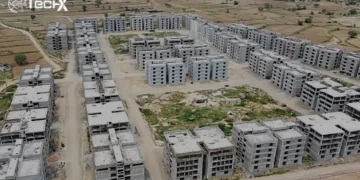The Pakistani government is considering raising the Capital Gains Tax (CGT) on real estate from 15% to 35% in the 2025-26 budget. This significant increase aims to align property taxes with corporate rates and enhance revenue collection. The proposal follows discussions with the IMF, which has urged Pakistan to expand its tax base and improve fiscal sustainability.
IMF Influence on Fiscal Policy
The decision stems from a virtual meeting between the IMF and Pakistani officials regarding the upcoming fiscal budget. To meet IMF conditions, the government targets an 11% tax-to-GDP ratio by FY26. Real estate, a largely under-taxed sector, has been identified as a key area for boosting revenue. However, critics argue that excessive taxation may stifle economic growth.
Real Estate’s Role in Economic Stability
During Pakistan’s economic crisis in 2022-23, the real estate sector remained a stabilizing force. Projections suggested the sector would surpass $2 trillion by 2025. However, the proposed CGT hike could disrupt this growth, leading to reduced investment and market stagnation. Experts warn that higher taxes may deter buyers, negatively impacting the industry’s contribution to the economy.
Also Read: Pakistan Ranks Fifth Among Top Property Buyers in Dubai
Exemption for Stock Market Investments
Sources confirm that the increased CGT will not apply to stock market gains, focusing solely on real estate. This selective approach raises concerns about fairness, as it disproportionately affects property investors. Critics argue that the policy favors capital market participants while burdening middle-class citizens and small-scale real estate buyers with higher costs.
Potential Decline in Property Demand
Higher withholding taxes may discourage property transactions, leading to decreased demand. If buyers delay purchases to avoid steep taxes, the market could experience a slowdown. A drop in demand may also lower property prices, negatively impacting developers and investors. This could reverse the sector’s growth trajectory, harming an industry vital to Pakistan’s economy.
Impact on Real Estate Prices
Increased taxation often leads to reduced liquidity in the property market. Sellers may struggle to find buyers willing to bear the additional tax burden, forcing price corrections. While lower prices could benefit first-time buyers, existing investors may face losses. The long-term consequences could include reduced construction activity and job losses in related industries.
Government’s Revenue Objectives
The government argues that higher CGT will improve tax compliance and generate much-needed revenue. With real estate being a major wealth repository, taxing it more effectively could bridge fiscal deficits. However, without balancing taxation and growth incentives, the policy risks harming the sector more than benefiting the economy.
Investor Sentiment and Market Uncertainty
Uncertainty over tax changes has already caused hesitation among investors. Many are adopting a wait-and-see approach, delaying transactions until the budget is finalized. If the hike is implemented, foreign and local investors might shift focus to other sectors, further dampening real estate activity.
Need for a Balanced Approach
While increasing tax revenue is necessary, policymakers must consider the real estate sector’s economic role. A gradual tax hike or exemptions for low-value properties could mitigate adverse effects. The government should also improve transparency and reduce corruption in property valuations to ensure fair taxation.
Conclusion
The proposed CGT increase aims to strengthen Pakistan’s tax system but risks destabilizing the real estate market. Balancing revenue goals with economic growth is crucial to avoid long-term damage. Policymakers must engage stakeholders to design a tax strategy that supports both fiscal stability and sectoral growth.
















